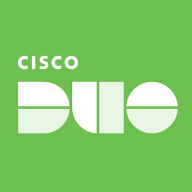

Find out in this report how the two Single Sign-On (SSO) solutions compare in terms of features, pricing, service and support, easy of deployment, and ROI.
The return on investment includes operational efficiency gains, security risk reduction, compliance with regulations, improved user experience, productivity benefits, reduced overhead, and better security posture.
We have achieved significant time efficiencies with AWS IAM Identity Center.
I think Cisco Duo offers a good return on investment for startups, newer organizations, or those utilizing cloud-based applications.
I have not seen ROI with Cisco Duo; probably the opposite, because it impedes productivity time to be able to get into the system.
From my point of view, the biggest return on investment when using Cisco Duo is the security and the ease of setting it up.
AWS provides immediate solutions and assistance whenever needed, especially if issues arise that cannot be handled internally.
They are prompt, keep you updated, and provide excellent assistance.
AWS offers better assistance plans for their services.
They got back to us quickly, were nice, and gave us what we needed.
I would rate their support 10 out of 10.
I would rate support for Cisco Duo a 10, as I have never had a negative experience.
AWS Identity Center successfully supports scalable deployments, allowing additional resources as the company grows.
The scalability of AWS IAM Identity Center is excellent.
It can handle both a small number of users and a bigger number of users efficiently.
In my last contracting position, it was a large one for a major worldwide airline that had hundreds of thousands of devices that could use Cisco Duo, and it scaled very well.
I believe Cisco Duo is very scalable because it is cloud-based.
We started out with just the basics, getting a token, and then we changed to push, and now, we have added the offline mode.
There can be issues if there is an outage on AWS's side, which could prevent logging in because your region might be down, affecting the Identity Center's availability.
It offers 99.96% uptime.
Stability-wise, it is functioning well without any outages or crashes.
We have not had any Cisco Duo outages across all the companies I have worked for that utilize Cisco Duo.
When there is a bigger problem, we get notifications from Cisco Duo saying, 'Hey, we have a problem,' and that has helped us.
We have never experienced any downtime.
Having a lot of users on one instance is hard to configure, so I hope for more flexibility and ease in configuration.
Enhancements could include automation tools or a centralized dashboard for managing roles and policies across multiple accounts, simplifying the process.
When configuring it with third-party tools, like Active Directory, the naming convention of permission sets requires careful attention, which can be confusing.
If you don't have internet access, you can't access your computer, only local access is available.
Cisco should allow easier integration with third-party equipment because Cisco's own equipment is expensive.
There needs to be consideration for how to launch Cisco Duo with a handheld device that is not native, where you can install the application.
AWS IAM Identity Center is available as a free service by default.
It is not that expensive, rated at three out of ten for costs.
Pricing for AWS IAM Identity Center is very affordable, rated at two out of ten with one being cheap.
The pricing is acceptable to them.
Their website lists $3 per month per user for the Essential license.
One of my customers recently received a billing statement charging 3,600 US dollars for 100 users for one year.
It provides the least privilege-based access control, which limits users to only the operations they need to perform without interfering with unrelated configurations.
These features allow for excellent micro-level control over resources, ensuring specific permissions are granted.
Its valuable features include granular access control, allowing precise control over who can access specific AWS resources and under what conditions using JSON-based policies.
From a management perspective, I appreciate that we can enroll or control devices on the back end for people who get a new phone and forget to handle Cisco Duo properly and need to add a new device.
Our company benefits from all those features of Cisco Duo with confidence, and we feel very secure with it in terms of authentication of our logins.
The benefit of having a complete passwordless environment in our organization is that it's gotten people away from using the sticky note under their keyboard - which is a huge problem.
| Product | Market Share (%) |
|---|---|
| Cisco Duo | 3.5% |
| AWS IAM Identity Center | 2.4% |
| Other | 94.1% |

| Company Size | Count |
|---|---|
| Small Business | 3 |
| Midsize Enterprise | 3 |
| Large Enterprise | 4 |
| Company Size | Count |
|---|---|
| Small Business | 31 |
| Midsize Enterprise | 18 |
| Large Enterprise | 38 |
AWS IAM Identity Center is the recommended service for managing your workforce's access to AWS applications or your multiple AWS accounts (or both). It is a flexible solution that can be used to connect your existing identity source or help you create users in AWS. IAM Identity Center can be used alongside your existing AWS account access configurations.
Cisco Duo is a cloud-based identity security platform safeguarding critical resources for any user and device worldwide. Known for its ease of use, Duo offers seamless protection across multi-cloud, hybrid, and on-premises environments.
Cisco Duo is designed to secure access with identity-first protection and provides extensive visibility throughout an organization's identity ecosystem. Offering multi-factor authentication, Duo facilitates easy integration and management, allowing teams to protect data effectively on VPNs, applications, and networks. Its single-pane management improves security processes while enhancing trust, making it suitable for diverse IT infrastructures.
What are the key features of Cisco Duo?
Which benefits and ROI should users consider?
In industries like education and finance, Cisco Duo is widely employed to secure multi-factor authentication across platforms such as email, databases, and servers. Its integration capabilities with Microsoft 365, Active Directory, and VPNs like AnyConnect are instrumental in verifying user identities using mobile apps or OTPs, catering effectively to both remote and on-premise environments.
We monitor all Single Sign-On (SSO) reviews to prevent fraudulent reviews and keep review quality high. We do not post reviews by company employees or direct competitors. We validate each review for authenticity via cross-reference with LinkedIn, and personal follow-up with the reviewer when necessary.